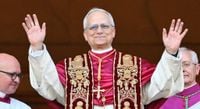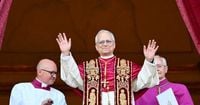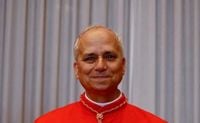In a historic election, Cardinal Robert Francis Prevost has been chosen as the new pope of the Catholic Church, taking the name Leo XIV. This marks a significant moment as Prevost becomes the first American pontiff in history. The election took place on May 8, 2025, following the death of Pope Francis on April 21, 2025.
The conclave, which began on May 7, saw 133 cardinals gather to select the new leader of the world's 1.4 billion Catholics. Prevost, 69, originally from Chicago, has spent much of his career as a missionary in Peru and was appointed a cardinal only in 2023. His election was announced by French Cardinal Dominique Mamberti from the balcony of St. Peter's Basilica, where tens of thousands had gathered to await the news.
Prevost's election comes at a time of great challenges for the Catholic Church. He faces pressing issues including the role of women in the church, the church’s stance on LGBTQ+ rights, and the ongoing struggle with clergy sexual abuse scandals. As a moderate who has been closely associated with the more progressive policies of Pope Francis, many are curious about how he will navigate these contentious topics.
Pope Francis, who served as the first Latin American pope, was known for his efforts to modernize the church and promote inclusivity, particularly towards LGBTQ+ individuals. He made landmark statements advocating for the acceptance of LGBTQ+ people, famously stating, "Who am I to judge?" in reference to gay priests. His papacy was characterized by a push for greater openness and reform within the church.
In contrast, Prevost's past comments have raised concerns among LGBTQ+ advocates. In a 2012 address to bishops, he criticized Western media for promoting what he termed the “homosexual lifestyle” and expressed disapproval of “alternative families” consisting of same-sex partners and their children. This has led to skepticism about his commitment to the progressive changes initiated by Francis.
Despite these concerns, there is cautious optimism among some groups. Marianne Duddy-Burke, executive director of DignityUSA, expressed hope that Prevost has evolved since his earlier comments. She noted, "[He] hasn’t said a lot since early 2010s. [I] hope he has evolved."
Prevost’s election was particularly notable not just for his nationality but also for the speed of the conclave. The selection of a new pope took just over one day, making it one of the swiftest conclaves in recent history. Historically, the length of papal conclaves has varied widely, with some taking as long as two years to conclude.
As Prevost steps into his role, he will likely have to confront the polarized views within the church regarding LGBTQ+ issues. While some cardinals advocate for a continuation of Francis's inclusive policies, others are pushing for a return to more traditional stances. The ideological divide among cardinals mirrors broader societal debates about acceptance and inclusivity.
Prevost's background as a missionary and his work in Peru have shaped his views on social justice, particularly concerning the poor and marginalized. He has stated that a bishop should not be a "little prince sitting in his kingdom," reflecting a commitment to humility and service.
In his first public address as pope, Prevost expressed a desire for peace and unity among families and communities worldwide. He stated, "I would like this greeting of peace to reach all your hearts and families… and people around the world. May peace be with you.” This message resonated with many who are eager to see how he will lead the church in the coming years.
The election of Leo XIV is not just a new chapter for the Catholic Church but also a reflection of the ongoing evolution of its leadership. As the church grapples with modern societal issues, the direction Prevost takes will be closely watched by both supporters and critics alike.
As the first American pope, Prevost's leadership could signify a shift in how the church engages with contemporary issues, particularly in the United States, where debates over LGBTQ+ rights and social justice are highly charged. The global Catholic community is looking to him for guidance and hope as he navigates the complexities of modern faith in a rapidly changing world.
The future of the Catholic Church under Leo XIV remains uncertain, but his election is a pivotal moment that could redefine the church's approach to inclusivity and reform. As the world awaits his first official actions and statements, many are hopeful for a continuation of the dialogue initiated by Pope Francis, while others are prepared for potential challenges ahead.






